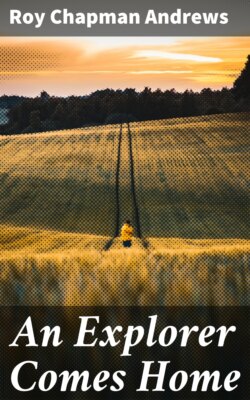Читать книгу An Explorer Comes Home - Roy Chapman Andrews - Страница 3
На сайте Литреса книга снята с продажи.
Foreword
ОглавлениеTable of Contents
An Explorer Comes Home is a continuation of my autobiography begun in Under a Lucky Star. It is not a chronicle of high adventure at the ends of the earth as was the earlier book; these adventures took place on a farm in Connecticut. It is a tale of how, after thirty-five years of sailing all the oceans of the world, my personal ship came to anchor in the quiet waters of Pondwood Farm; of why it anchored there and the kind of life we made for ourselves in the Berkshire Hills. It is also a part of my wife's biography, for our existence is so closely interwoven that there could be no separate story.
There was deep satisfaction in cutting our own home out of the ruin and devouring underbrush, somewhat as did the Connecticut pioneers when they came to this virgin Green Woods country. It was the personal effort and labor that made them cling so passionately to their log cabins and little fields, even when they rose each morning to face the possibility of an Indian massacre. Like them, every foot of ground we cleared, every rock we moved, every bush we planted, sunk our roots deeper into Pondwood soil.
Mere existence in impossibly crowded cities becomes more difficult and more unpleasant every day. It is a major operation to find a place to lay one's head at night, food to eat, and clothes to wear. One takes what one can get, not what one wants. The advantages that once made city life delightful have vanished into the limbo of the past; I doubt if they will return in our generation. Even diversions are so fraught with difficulties that they seem hardly worth the effort. Going deeper underground or higher in the air and double-decking streets will only make it possible for more humans to exist, but not to live, in the same area. The saturation point has almost been reached. Census statistics show that a large part of our population is rural but non-farm, and that the percentage is increasing every year. Those wise ones, who have seen the writing on the wall and abandoned cities for the country, know how interesting and satisfying such a life can be, whether it is lived on one acre or a thousand, whether one is rich or poor.
This book, however, is in no sense propaganda for country living or subsistence farming. Pondwood is a farm in name only. It is merely the story of how one explorer solved the problem of what to do when he stopped exploring and of two people who are enjoying themselves hugely in rural Connecticut.
I have written the narrative more or less chronologically as our life moved and expanded at Pondwood Farm. Its unpremeditated beginning was motivated by a rather blind confidence that that highroad would lead to happiness; its development has been a complete justification of our intuition.
The surroundings of Pondwood are redolent of New England's early history. Some of the houses were built by the first settlers and are still occupied by families whose ancestors came here when America was young. A century and a half seems only yesterday to them for they live with the furniture brought to Connecticut on oxcarts and maintain many of the customs of pre-Revolutionary days. Thus it is inevitable that sketches of Colebrook history should invade this book because it is the background against which we live. The interest, however, is more than local, for Colebrook typifies many other New England villages and its story is part of the heritage and tradition of the pioneer stock that constitutes the greatest stability of our national life.
My information about Colebrook's past has been largely derived from Irving E. Manchester's excellent The History of Colebrook and from those gentlemen who are mentioned in the book. To them I extend my thanks. I am grateful, also, to Mrs. Dorothy Byers of Groton, Massachusetts, who has read the manuscript and has offered much constructive criticism.
Roy Chapman Andrews
Pondwood Farm
Colebrook, Conn.
